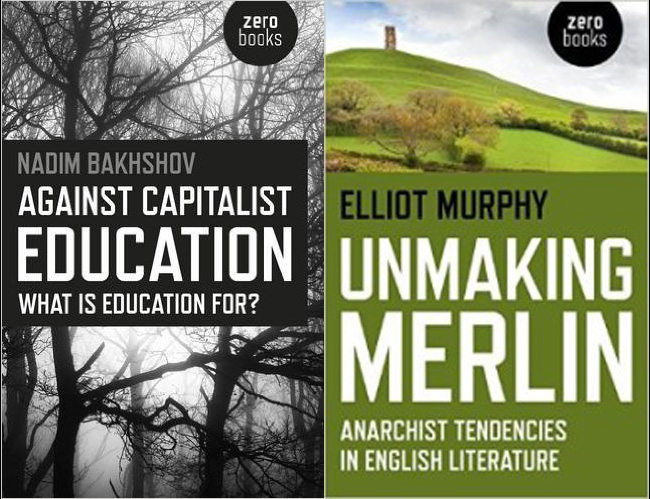Unmaking Merlin: Anarchist Tendencies in English Literature,
Elliot Murphy (Zero Books)
Against Capitalist Education. What is Education For?,
Nadim Bakhshov (Zero Books)
Two interesting titles from the fiercely independent Zero Books, which unfortunately turn out to be disappointing reads.
Murphy’s book simply doesn’t do what it says it does. He rehearses a rather ordinary history of anarchism, and occasionally throws in some literary references. I was expecting either a kind of ‘hidden’ literature weaving its way through the remains of the canon, or a discussion of how anarchism is and is not presented in literature (e.g. Joseph Conrad’s The Secret Agent, which I note is getting the primetime TV treatment).
The book does get better as it goes on, but I wanted more about the literature and less of the anarchism-by-numbers: there are much better discussions of anarchism available and, I’m convinced, a much more exciting discussion of those ‘anarchist tendences’ waiting to be written. Where, for instance, is Julian Beck and the Living Theatre? Kenneth Patchen? And a host of others…
Against Capitalist Education certainly has it’s heart in the right place, and has some terrific quotes throughout, normally aimed at the way universities have simply become corporate businesses, delivering degrees to their customers, judging their success rate by the level of degrees awarded, rather than individually considering personal growth, inquisitiveness and all-round development.
So Bakhshov is quite right is saying the time is ripe for thinking if it might be possible to step outside this business model and re-imagine a university committed to breadth of knowledge rather than specialisms. Unfortunately he takes Plato as his model, brushing aside any questions we might have about the problematic political and societal context, and delivers his ideas in a clunky imaginary conversation between two lecturers caught up in today’s university system.
The speeches here are wooden and unrealistic, awkward and mannered, and unfortunately the ‘vision’ presented remains abstract and veers as the book goes on toward new age woffle. Bahkshov seems oblivious to the fact that, for example, pure maths and fine art (as well as music) share forms and ideas anyway – despite the current move toward specialism – as he postulates some vague idea of a shared idealistic research core. Yes, there should be room for a humanist university (even one that engages, as Bakhshov suggests with spirituality), but none of these ideas are worked out in this text. Instead, it appears the author thinks having the discussion is enough. Personally, whilst Bakhshov is good on diagnosis he is not good on cure, and the form of this debate lets him down. Better some genuine political and pedagogical research about how and why we might learn, its links to play (cf. Colin Ward and many others), and some practical suggestions about the setting up of alternative centres of learning. Perhaps it’s time to cast a critical eye over the commune movement, home schooling, Dartington College, Summerhill etc? Not to mention the Occupy movement’s education workshops.
Zero Books aim to be ‘intellectual without being academic’, which perhaps says more about the current state of academia (or the public’s perception of it) than Zero Books, but here there’s a kind of pseudo-intellectualness on show rather than the clarity and precision which good academic writing evidences. Murphy and Bakhshov are to be applauded for their effort, but in the end not for what they’ve written.
Rupert Loydell
.


I’ve been rereading Murphy since I wrote this, and realised of course that Julian Beck and Kenneth Patchen are hardly English literature, as they’re both American authors. So apologies for that, although my criticism of Murphy’s book remains – that it’s not about anarchist literature, more about anarchism and literature.
I’d also like to say that the chapter on education in Unmaking Merlin is actually much better than Bakhshov’s overall discussion in his book
Comment by Rupert on 22 July, 2016 at 7:50 am